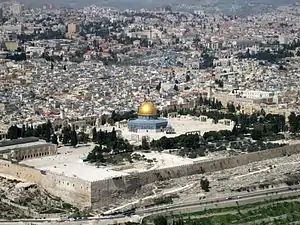United Nations Security Council Resolution 1322
In United Nations Security Council resolution 1322, adopted on 7 October 2000, after recalling resolutions 476 (1980), 478 (1980), 672 (1990) and 1073 (1996), the Council deplored the visit by Ariel Sharon to the Temple Mount (referred to in the Resolution by its Arab name Al-Haram Al-Sharif) and the subsequent violence which, according to the Resolution, had resulted in the deaths of over 80 Palestinians.[1] The Resolution did not condemn or mention reported Israeli deaths,[2] although it did deplore what it described as "many other casualties."
| UN Security Council Resolution 1322 | ||
|---|---|---|
 | ||
| Date | 7 October 2000 | |
| Meeting no. | 4,205 | |
| Code | S/RES/1322 (Document) | |
| Subject | The situation in the Middle East, including the Palestinian question | |
Voting summary |
| |
| Result | Adopted | |
| Security Council composition | ||
Permanent members | ||
Non-permanent members | ||
| ||
The Security Council reaffirmed that a settlement of the conflict must be based on resolutions 242 (1967) and 338 (1973), which called for peace based on negotiations between the Israeli and Arab sides. In this regard, it supported the Israeli-Palestinian peace process and reaffirmed the need for the full respect of the Holy Places of Jerusalem by all.
The resolution labeled Sharon's visit to the Temple Mount a "provocation," and it deplored the visit as well as subsequent violence there and throughout the other Israeli-occupied territories, particularly the use of force against Palestinians. The violence was the worst in years, and marked the beginning of the Second Intifada.[3] The Council called for an immediate cessation of hostilities and return to negotiations and it called upon Israel to abide by its responsibilities under the Fourth Geneva Convention concerning the protection of civilians in war.[4] It stressed the importance of an objective inquiry into the recent events with the aim of preventing further repetition. Finally, the Secretary-General Kofi Annan was required to keep the Council informed on developments.
The resolution was sponsored by Malaysia and supported by several European countries.[5] The original version of the resolution sought a strong condemnation of Israel. The United States, which abstained, threatened to veto this version, and the language was modified to remove mention of Israel by name.[6]
See also
References
- "Security Council condemns 28 September provocation in Jerusalem". 7 October 2000.
- "Victims of Palestinian Violence and Terrorism since September 2000". Ministry of Foreign Affairs. Retrieved 9 April 2012.
- "'Provocative' mosque visit sparks riots". BBC News. 28 September 2000.
- Marshall, Edgar S. (2002). Israel: current issues and historical background. Nova Publishers. p. 6. ISBN 978-1-59033-325-9.
- Kutty, Faisal (2000). "Canada's Support of U.N. Security Council Resolution Draws Mixed Reaction From Politicians". Washington Report on Middle East Affairs: 48, 77, 78. Archived from the original on 23 April 2005. Retrieved 21 November 2006.
- "Security Council Resolution 1322 (2000), End of Violence". Ministry of Foreign Affairs. 7 October 2000.
External links
 Works related to United Nations Security Council Resolution 1322 at Wikisource
Works related to United Nations Security Council Resolution 1322 at Wikisource- Text of the Resolution at undocs.org